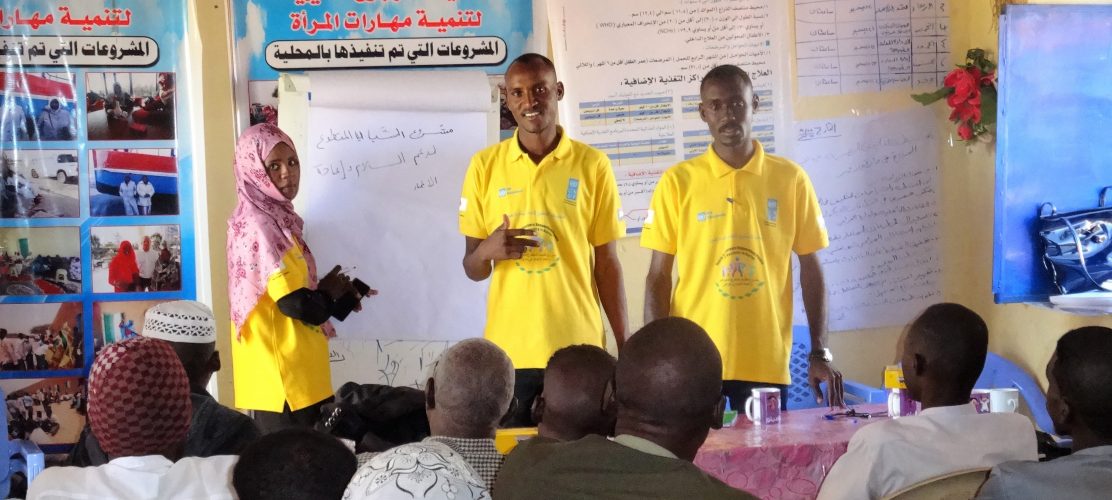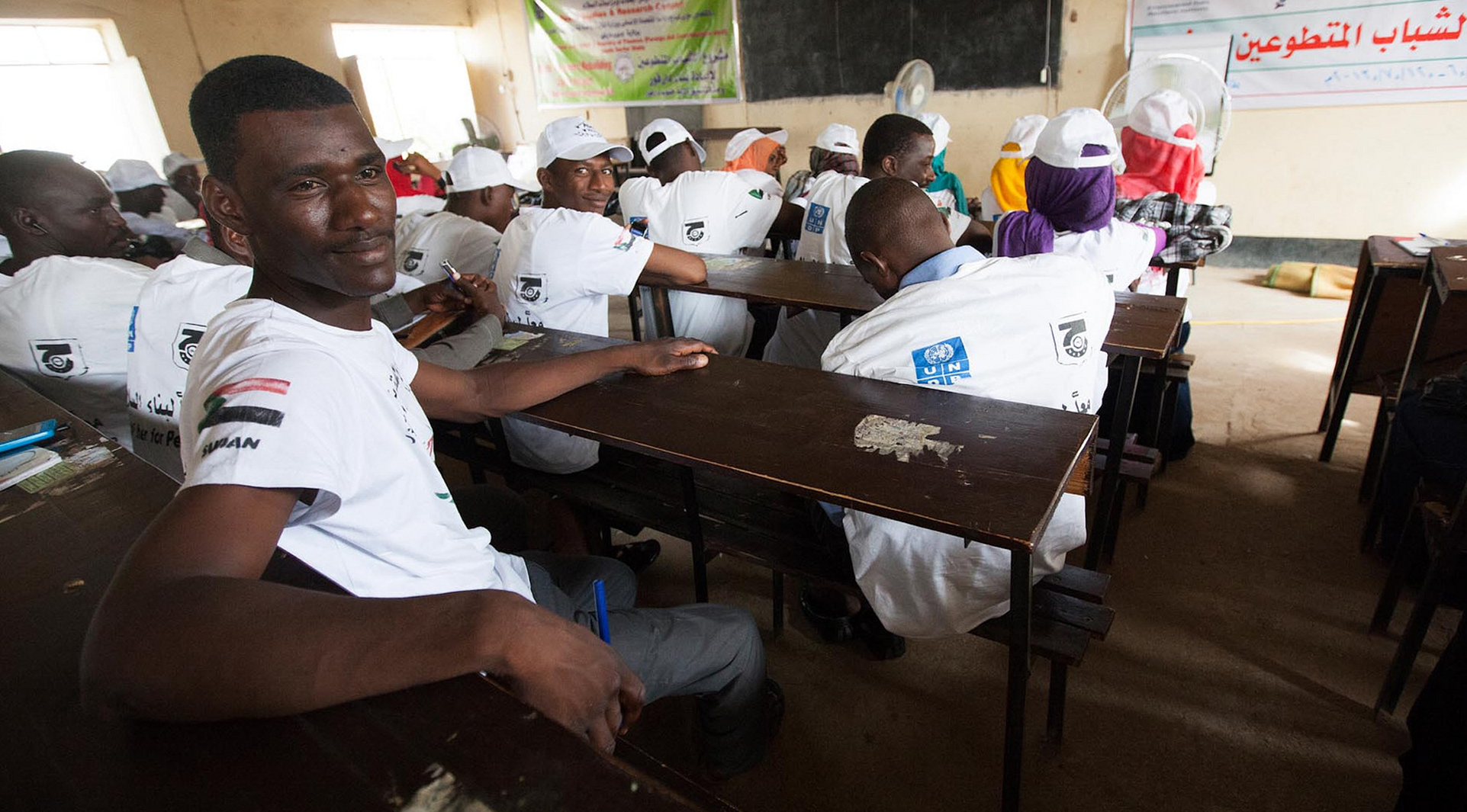Landmark UN Youth Strategy brings new paradigm by placing youth as agents of change
This NORRAG Highlights was prepared by Hiromi Amano, Youth and Livelihoods Officer at UNDP Sudan on the occasion of the launch on 24 September 2018 of the United Nations (UN) Youth Strategy. In this post, the author stresses the importance of providing youth with the social, educational and economical opportunities to become active agents of change, in line with the Sustainable Development Agenda. She concludes with the presentation of an ongoing UNDP-led youth project in Sudan.
There are 1.8 billion youth[1] who are almost matured physically and mentally, and have strong wishes to learn more and use their potential for good. However, this social group is often overlooked by adult-led society. In humanitarian and development programmes, for example, youth have often been grouped with children or adults, and they have not been provided enough opportunities or support that meet their specific needs. United Nations’ Youth strategy “Youth 2030: working with and for young people” (Youth 2030) is the first strategy launched by the United Nations (UN) that focuses on young people and recognizes their positive contributions as important agents of change in the world.
A UN Youth strategy
“If we are to create a more peaceful, sustainable and prosperous world for all to fulfil the vision of the 2030 Agenda for Sustainable Development, we need young people to lead.”[2] UN Secretary-General Antonio Guterres made this remark at the launch of the UN Youth strategy on 24 September 2018. Youth 2030 acts as an umbrella framework to guide the UN across its three pillars: peace and security, human rights, and sustainable development. It seeks to strengthen the UN’s capacity to work with and for young people and benefit from their views, insights and ideas, and to ensure that the UN’s work on youth issues is pursued in a coordinated, coherent and holistic manner[3]. The strategy will span 12 years until 2030[4] and it set five priorities:
- amplify youth voices for the promotion of a peaceful, just and sustainable world;
- support young people’s greater access to quality education and health services;
- support young people’s greater access to decent work and productive employment;
- protect and promote the rights of young people and support their civic and political engagement;
- support young people as catalysts for peace and security and humanitarian action.
Since the launch, a number of the representatives in UN agencies such as United Nations Development Programme (UNDP, video), United Nations Educational, Scientific and Cultural Organization (UNESCO, video), United Nations High Commissioner for Refugees (UNHCR, video) and Office of the United Nations High Commissioner for Human Rights is a United Nations (OHCHR, video), have shown their commitments to support Youth 2030 and to work with and for young people. The year of 2018 became a major landmark in establishing a new paradigm of youth and 2019 should follow the momentum and demonstrate practical actions.
Skills and education that youth need
On 24 September 2018, in addition to Youth 2030, the Generation Unlimited (Gen-U) initiative was launched during an event co-hosted by the UN Secretary-General’s Envoy on Youth and UNICEF Executive Director. Gen-U is a global partnership that aims to ensure that every young person is in education, learning, training or employment by 2030. It also seeks to create synergies between major global actors and accelerates momentum towards achievement of the Sustainable Development Goals.[5]
Access to quality education and employment (for those who have reached legal working age) are high among the challenges that youth have been facing. The ILO estimates that 21.8 per cent of youth at the age of 15 to 24 in countries with available data are not in employment, education or training and 76.9 per cent of which are female.[6] More efforts are indeed required to ensure access to quality education for youth, especially young females. Youth 2030 stresses the need to develop and deliver inclusive education for youth that is learner-centred, adopts a lifelong learning approach, and is relevant to their lives and the social, economic and environmental needs of their communities. It also promotes non-formal education and its role in the development of young people’s knowledge, skills and competencies.
As Gen-U aims at ensuring youth’s engagement in education, learning, training or employment, Youth 2030 advocates for a balanced approach to stimulate the youth labour demand and prompt improvements in skills development systems. To develop an education project for youth, it is important to consider the linkage between education and employment as most youth are physically and mentally ready to begin working, whether in formal or informal settings. And for this, it is a prerequisite to identify and understand the needs of youth on the ground.
A UNDP-led, youth-centred project, to support Peace and Recovery in Darfur, Sudan
United Nations Developing Programme (UNDP) has committed to support Youth 2030, stressing that the five priority areas of the strategy are in line with its mandate and corporate vision and highly relevant to its comprehensive portfolio of projects and programmes.[7] UNDP has various projects focusing on youth and as part of a Youth Global Programme for Sustainable Development and Peace (Youth- GPS)[8], UNDP has already supported more than 60 countries in promoting youth civic engagement, political participation and economic empowerment, young people’s role as peacebuilders and young people’s meaningful engagement in the 2030 Agenda.
 UNDP’s Youth Volunteers Supporting Peace and Recovery in Darfur (YoVoReD) project is a youth-centred initiative in Darfur, Sudan. The project gives practical meaning to Youth 2030 by building skills and capacities of youth to empower their communities and play an active role in the peace and recovery processes of Darfur.
UNDP’s Youth Volunteers Supporting Peace and Recovery in Darfur (YoVoReD) project is a youth-centred initiative in Darfur, Sudan. The project gives practical meaning to Youth 2030 by building skills and capacities of youth to empower their communities and play an active role in the peace and recovery processes of Darfur.
The project, launched in 2012 and currently in its fourth phase, operates with a two-step approach: first, university-graduated youth in Darfur receive intensive training in micro-enterprise development, microfinance, green business, natural resource management and peace building. In a second step, the project deploys the trained youth to their own communities for nine months as youth volunteers, where they give training to their community members and share skills and knowledge to improve livelihoods and peacebuilding. In addition, through the project, the youth volunteers actively promote youth civic engagement and promote volunteerism by organizing a series of events on International Youth Day, International Day of Peace and International Volunteers day, involving local authorities and communities. The project places youth in the driving seats as active agents of change in their community.
As a result, the project achieved an unprecedented outreach across all the five Darfur states suffering from armed conflict for almost 15 years and where access to communities and populations remain an issue for international organizations. As of January 2019, a total of 579 youth had been trained and deployed and they have supported more than 45,000 vulnerable community members by improving their knowledge and skills in livelihood and agricultural development/expansion as well as peacebuilding. The project also proves that giving necessary skills and opportunities is a strong tool that enable youth to build their capacities and act as agents of peace and change in their communities, which in turn, protect young people from the risks of joining violent or criminal acts.
 The success of YoVoReD project rests on its innovative youth-centred approaches: firstly, harnessing and utilizing the talents and capacities of the local youth, and secondly including youth voices by organizing review meetings and conducting youth needs/evaluation surveys so that the project can be improved after each phase to become more relevant to the needs on the ground. The YoVoReD project has been working with and for youth and covers the main elements in all the five priorities listed by the Youth 2030.
The success of YoVoReD project rests on its innovative youth-centred approaches: firstly, harnessing and utilizing the talents and capacities of the local youth, and secondly including youth voices by organizing review meetings and conducting youth needs/evaluation surveys so that the project can be improved after each phase to become more relevant to the needs on the ground. The YoVoReD project has been working with and for youth and covers the main elements in all the five priorities listed by the Youth 2030.
As Youth 2030 stresses, youth empowerment, engagement and participation are the keys to successful youth-centred initiatives and youth-led actions that imagine youth not just as passive beneficiaries but as active actors or partners to overcome challenges together. These youth centred/led initiatives will enhance young people’s capacity, build self-esteem and enable them to have a sense of fulfilment in their lives as active members, and at the same time, will improve the recognition of youth as agents of change in society. Youth2030 thus offers strong leverage to promote more youth centred and youth-led programmes, policies and strategies at global, regional and country-level.
For more information on UNDP Sudan’s YoVoReD project, please read the online photo-story: http://bit.ly/YoVoReD1to3. The YoVoRed has been supported by the Republic of Korea, Japan and UNV programme.
[1] Aged 10 to 24 years. Noting that there is no universally agreed international definition of youth and while recognizing that the UN Secretariat for statistical purposes defines ‘youth’ as those persons between the ages of 15 and 24 years, this Strategy considers other definitions in use by Agencies, Programmes and/or Member States without prejudice. Retrieved from: https://www.un.org/sustainabledevelopment/wp-content/uploads/2018/09/18-00080_UN-Youth-Strategy_Web.pdf
[2] Secretary-General Launches United Nations Youth Strategy, ‘Generation Unlimited’ Partnership, Marking Start of Organization’s New Era for Young People, retrieved from: https://www.un.org/press/en/2018/sgsm19234.doc.htm
[3] Youth 2030 Working for young people, retrieved from: https://www.un.org/sustainabledevelopment/wp-content/uploads/2018/09/18-00080_UN-Youth-Strategy_Web.pdf
[4] An initial action plan will be developed and will cover the first four years, then to be reviewed, adjusted and renewed for the subsequent quadrennial phases. ibid
[5] UNICEF, Generation Unlimited, retrieved from: http://www.genunlimited.org/GenUBrochure_FINAL.pdf
[6] ILO, Global employment trends for youth 2017, retrieved from: https://www.ilo.org/wcmsp5/groups/public/—dgreports/—dcomm/—publ/documents/publication/wcms_598669.pdf
[7] http://www.undp.org/content/undp/en/home/news-centre/speeches/2018/launch-of-un-youth-strategy.html
[8] Abdoulaye Mar Dieye, Launch of the UN Youth Strategy, retrieved from: http://www.undp.org/content/dam/undp/library/Democratic%20Governance/Youth/Youth-GPS%20-%2050613%20UNDP%20PRODOC%20-%20final_web.pdf
Photo credits: UNAMID / Albert González Farran / UNDP Sudan
Contribute: The NORRAG Blog provides a platform for debate and ideas exchange for education stakeholders. Therefore, if you would like to contribute to the discussion by writing your own blog post please visit our dedicated contribute page for detailed instructions on how to submit.
Disclaimer: NORRAG’s blog offers a space for dialogue about issues, research and opinion on education and development. The views and factual claims made in NORRAG posts are the responsibility of their authors and are not necessarily representative of NORRAG’s opinion, policy or activities.

